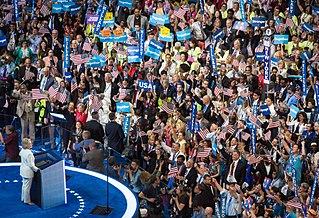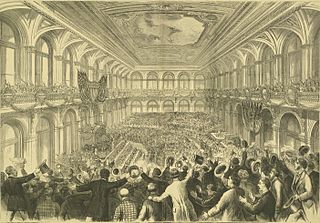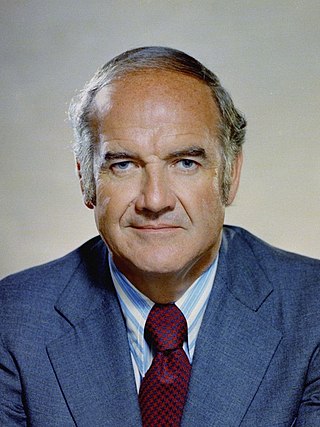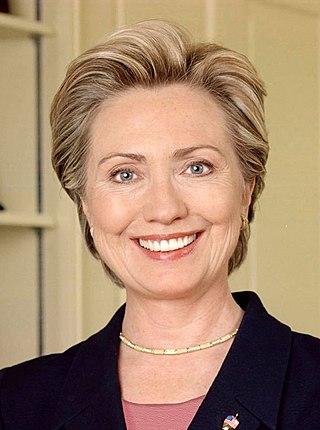Related Research Articles
Primary elections, or direct primary are a voting process by which voters can indicate their preference for their party's candidate, or a candidate in general, in an upcoming general election, local election, or by-election. Depending on the country and administrative divisions within the country, voters might consist of the general public in what is called an open primary, or solely the members of a political party in what is called a closed primary. In addition to these, there are other variants on primaries that are used by many countries holding elections throughout the world.

The presidential primary elections and caucuses held in the various states, the District of Columbia, and territories of the United States form part of the nominating process of candidates for United States presidential elections. The United States Constitution has never specified the process; political parties have developed their own procedures over time. Some states hold only primary elections, some hold only caucuses, and others use a combination of both. These primaries and caucuses are staggered, generally beginning sometime in January or February, and ending about mid-June before the general election in November. State and local governments run the primary elections, while caucuses are private events that are directly run by the political parties themselves. A state's primary election or caucus is usually an indirect election: instead of voters directly selecting a particular person running for president, they determine the number of delegates each party's national convention will receive from their respective state. These delegates then in turn select their party's presidential nominee. The first state in the United States to hold its presidential primary was North Dakota in 1912, following on Oregon's successful implementation of its system in 1910.

The Iowa caucuses are biennial electoral events for members of the Democratic and Republican parties in the U.S. state of Iowa. Unlike primary elections in most other U.S. states, where registered voters go to polling places to cast ballots, Iowans instead gather at local caucus meetings to discuss and vote on the candidates. During both the presidential and midterm election seasons, registered Iowan voters vote in a per-precinct caucus for the party of which they are registered as a member. The caucuses are also held to select delegates to county conventions and party committees, among other party activities.

Super Tuesday is the United States presidential primary election day in February or March when the greatest number of U.S. states hold primary elections and caucuses. Approximately one-third of all delegates to the presidential nominating conventions can be won on Super Tuesday, more than on any other day. The results on Super Tuesday are therefore a strong indicator of the likely eventual nominee of each political party.

The Democratic National Convention (DNC) is a series of presidential nominating conventions held every four years since 1832 by the United States Democratic Party. They have been administered by the Democratic National Committee since the 1852 national convention. The primary goal of the Democratic National Convention is to officially nominate a candidate for president and vice president, adopt a comprehensive party platform and unify the party. Pledged delegates from all fifty U.S. states, the District of Columbia and the American territories, and superdelegates which are unpledged delegates representing the Democratic establishment, attend the convention and cast their votes to choose the party's presidential candidate. Like the Republican National Convention, the Democratic National Convention marks the formal end of the primary election period and the start of the general election season. Since the 1980s the national conventions have lost most of their importance and become mostly just ceremonial coronation events for the respective candidate, as since the full establishment of primary contests in that time the winning nominees of both parties have always been clear long time before the convention. In 2020, both major parties, and many minor parties, replaced their usual in-person conventions with virtual programs due to the COVID-19 pandemic.
In American politics, a superdelegate is an unpledged delegate to the Democratic National Convention who is seated automatically and chooses for themselves for whom they vote. These Democratic Party superdelegates include party leaders and elected officials (PLEOs).

A United States presidential nominating convention is a political convention held every four years in the United States by most of the political parties who will be fielding nominees in the upcoming U.S. presidential election. The formal purpose of such a convention is to select the party's nominee for popular election as President, as well as to adopt a statement of party principles and goals known as the party platform and adopt the rules for the party's activities, including the presidential nominating process for the next election cycle.

From January 3 to June 3, 2008, voters of the Democratic Party chose their nominee for president in the 2008 United States presidential election. Senator Barack Obama of Illinois was selected as the nominee, becoming the first African American to secure the presidential nomination of any major political party in the United States. However, due to a close race between Obama and Senator Hillary Clinton of New York, the contest remained competitive for longer than expected; neither candidate received enough pledged delegates from state primaries and caucuses to achieve a majority, without endorsements from unpledged delegates (superdelegates).
The McGovern–Fraser Commission, formally known as Commission on Party Structure and Delegate Selection, was a commission created by the Democratic National Committee (DNC) in response to the tumultuous 1968 Democratic National Convention. It was composed of 28 members, selected by DNC chairman Senator Fred R. Harris in 1969 to rewrite the Democratic Party's rules regarding the selection of national convention delegates. Senator George McGovern and later Representative Donald M. Fraser led the commission, which is how it received its name. McGovern, who resigned from the commission in 1971 in order to run for president, won the first nomination decided under the new rules in 1972, but lost the general election to Richard Nixon.

From January 3 to June 3, 2008, voters of the Republican Party chose their nominee for president in the 2008 United States presidential election. Senator John McCain of Arizona was selected as the nominee through a series of primary elections and caucuses culminating in the 2008 Republican National Convention held from Monday, September 1, through Thursday, September 4, 2008, in Saint Paul, Minnesota. President George W. Bush was ineligible to be elected to a third term due to the term limits established by the 22nd Amendment.

Super Tuesday 2008, Super Duper Tuesday, Mega Tuesday, Giga Tuesday, Tsunami Tuesday, and The Tuesday of Destiny are names for February 5, 2008, the day on which the largest simultaneous number of state U.S. presidential primary elections in the history of U.S. primaries were held. Twenty-four states and American Samoa held either caucuses or primary elections for one or both parties on this date. Furthermore, the week-long Democrats Abroad Global Primary began on this day.

From January 24 to June 20, 1972, voters of the Democratic Party chose its nominee for president in the 1972 United States presidential election. Senator George McGovern of South Dakota was selected as the nominee through a series of primary elections, caucuses, and state party conventions, culminating in the 1972 Democratic National Convention held from July 10 to July 13, 1972, in Miami, Florida.
The results of the 2008 Democratic Party presidential primaries are the detailed outcomes of a series of contests by which members of the United States Democratic Party chose their candidate for the 2008 U.S. presidential election. The contests are held in each of the fifty U.S. states, as well as the District of Columbia, Puerto Rico, American Samoa, Guam, the U.S. Virgin Islands, and Democrats Abroad. The outcomes include totals of delegates selected as well as popular votes

The 2008 Nevada Democratic presidential caucuses took place on January 19, 2008 after having been moved from a later date by the Nevada Democratic Party. The Nevada Democratic Caucus was considered important in determining the eventual party nominee, as many described it as the "Bellwether of the West" seeing as how it is the first Western state to vote in the Democratic Presidential Primary season.

The Nevada presidential caucuses were an electoral event in which citizens met in precinct caucuses to elect delegates to the corresponding county conventions. The 2020 Nevada caucuses were the last held in the state before the state legislature signed a law which abolished the Nevada Caucus and replaced it with a Primary. There are 17 counties in Nevada and so there are 17 conventions. The county conventions then select delegates to Nevada's State Convention, which then choose delegates for the presidential nominating conventions.

The 2008 Colorado Democratic presidential caucuses took place on Super Tuesday, February 5, 2008. As he did in every other state that held a caucus rather than a primary, Barack Obama won the caucus by a wide, two-to-one margin over Hillary Clinton.

Voters of the Republican Party elected state delegations to the 2012 Republican National Convention in presidential primaries. The national convention then selected its nominee to run for President of the United States in the 2012 presidential election. There were 2,286 delegates chosen, and a candidate needed to accumulate 1,144 delegate votes at the convention to win the nomination. The caucuses allocated delegates to the respective state delegations to the national convention, but the actual election of the delegates were, many times, at a later date. Delegates were elected in different ways that vary from state to state. They could be elected at local conventions, selected from slates submitted by the candidates, selected at committee meetings, or elected directly at the caucuses and primaries.

Presidential primaries and caucuses were organized by the Democratic Party to select the 4,051 delegates to the 2016 Democratic National Convention held July 25–28 and determine the nominee for president in the 2016 United States presidential election. The elections took place within all fifty U.S. states, the District of Columbia, five U.S. territories, and Democrats Abroad and occurred between February 1 and June 14, 2016.

The Colorado Caucus is the electoral process used in Colorado to appoint candidates for certain political offices and start the process of electing new leaders for political party leadership. It takes the form of a series of precinct caucuses, meetings of registered electors within a precinct who are members of a particular major political party. The purpose of precinct caucuses is to elect precinct committee persons and delegates to county assemblies, including those that elect delegates to the presidential nominating conventions.

Presidential primaries and caucuses were organized by the Democratic Party to select the 3,979 pledged delegates to the 2020 Democratic National Convention held on August 17–20 to determine the party's nominee for president in the 2020 United States presidential election. The elections took place in all 50 U.S. states, the District of Columbia, five U.S. territories, and Democrats Abroad, and occurred between February 3 and August 11.
References
- 1 2 Kamarck, Elaine (February 14, 2008). "A History of 'Super-Delegates' in the Democratic Party". John F. Kennedy School of Government . Retrieved September 11, 2015.
{{cite journal}}: Cite journal requires|journal=(help) - ↑ Raymond, Walter (1992). Dictionary of Politics: Selected American and Foreign Political and Legal Terms . Brunswick Publishing Corporation. p. 81. ISBN 9781556180088.
- ↑ Sabato, Larry; Ernst, Howard R. (2007). Encyclopedia of American political parties and elections. New York: Infobase Publishing. ISBN 978-0816073313.